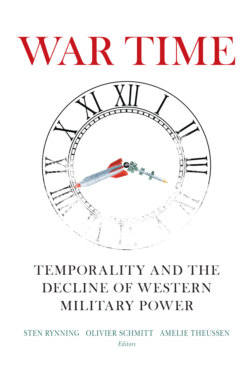War Time

Реклама. ООО «ЛитРес», ИНН: 7719571260.
Оглавление
Группа авторов. War Time
Contents
Foreword
Acknowledgments
Introduction
Trajectories: The Fate of the West
Perceptions: Western Thought and International Norms
Pace: Imposing Speed on War
The Structure of the Book
NOTES
PART I
The Western Experience in Balancing Liberal and Military Virtues
NOTES
ONE. The Modern State
War and State Development
The Rise of the Extractive State
Status Quo Ante: Militarism without Civic Grounding
Conclusion
NOTES
TWO. Making Time an Ally
Prediction and Paradox
The Hype behind Hyperwar
Speed, Pace, and Maintaining Policy Primacy
Recommendations for Policymakers and Strategists
NOTES
THREE. Benefit or Burden?
The Evolution of NATO Partnership
The International Security Assistance Force (ISAF)
Operation Unified Protector
Article 5: A Role for Partners?
In Defense of Liberal Values
NOTES
FOUR. The Future of the West
Brussels, September 2024
Berlin, November 2024
Washington, DC, April 2025
Warsaw, June 2025
London, July 2025
Paris, August 2025
NATO and the West beyond 2025: Demise or Renewal?
NOTES
PART II
A Normative Order under Pressure
NOTES
FIVE. Civilian Casualties and Contemporary Coalition Operations
Preventing Civilian Casualties as a Strategic Imperative
Norms and Civilian Harm
Context: Establishing NATO’s International Security Assistance Force (ISAF)
Missing: Campaign Coherence?
Missing: Campaign Continuity?
Missing: Coherent Strategy?
Conclusions
NOTES
SIX. Conflicting Norms of Intervention
Existing Norms on the Use of Force
Humanitarian Intervention and the Responsibility to Protect
Russian Attitudes
China’s Approach
India’s Position
The Perspective of the RIC States
Conclusion
NOTES
SEVEN. In the Shadows
Emerging Challenges to the Western Understanding and Practice of War
The Western Perception of Contemporary War
The Russian Perception of Contemporary War
The Chinese Perception of Contemporary War
How Gray Zone Conflicts Challenge the West
Countering Chinese and Russian Gray Zone Warfare
NOTES
EIGHT. Competing Norms
Scenario
China’s Motivations for Intervening in Djibouti
A Response from “the West”
Dealing with a Fait Accompli
Conclusion
NOTES
PART III
Speed, Time, and Western Military Power
NOTES
NINE. Fighting, Fast and Slow?
Fighting Fast: Strategic Imperative and Organizational Culture Preferences
Fighting Slow: Adjusting the War Tempo?
Conclusion: Balancing Fast and Slow Fighting—Mission Impossible?
NOTES
TEN. War at Information Speed
Why Do These Documents Matter?
What Is Multi-Domain?
Air Force Operational Agility through Multi-Domain Command and Control
The Army’s Multi-Domain Battle/Operations (MDO) and Convergence
Navy Distributed Maritime Operations—From Ships to Nodes
Conclusion: Information, Data, Speed, and the Politics of Decision
NOTES
ELEVEN. The Limits of Technology
Three Approaches to Technology: Stability, Balance, and Opportunism
Case Studies in Speed: Hypersonic Missiles and AI Pattern Recognition
Implications: Keeping Up with the Competition
Policy Recommendations
Conclusion
NOTES
TWELVE. Military Operations
Tessalit, Mali, January–March 2024
Paphos, Cyprus, April 2024
Rukla, Lithuania, September 2025
Facing the Emerging Battlefield: Paradox and the Need to Change Our Praxis
Organizational Implications
NOTES
Conclusion
A Western Condition?
A Changing Condition?
What Is to Be Done?
Striking a Balance
NOTES
Contributors
Index
Отрывок из книги
Providing new perspectives and knowledge on an increasingly complex, uncertain, and interconnected world.
The Chatham House Insights Series
.....
State history and context greatly shape changing perceptions of time. For example, as Christopher Clark has demonstrated, different understandings of the role of time had a significant impact on the political stance of different German leaders. In the seventeenth century the Great Elector perceived the present as a precarious condition between a terrible past and an uncertain future, and conceived his leadership role as breaking from entangling traditions in order to maximize choices between multiple possible futures. In contrast, in the following century Frederick II conceived of time as cyclical and aimed at establishing a sort of political stasis that could only benefit the state, while in the nineteenth century Bismarck was caught in a tension between his perception of the political leader as a decisionmaker navigating the torrent of history to the best of his abilities, and a sense of the state’s nature as being eternal.32 Remarkably, from the perspective of International Relations scholarship, the importance of perceptions of time has only rarely been applied to the study of war, although this topic is of increasing interest to scholars.33 For example, David Edelstein has explored how different time perceptions between states (which he calls “time horizons”) can cause strategic frictions: depending on their time horizons, states may favor short-term cooperation and thus inadvertently empower rivals who will challenge them in the long run.34 Similarly, strategic surprises may often result from conflicting time horizons between policymakers.
Perceptions of time sometimes converge and achieve durability as they become institutionalized, notably in the international arena, where governance by law and custom is notoriously subject to the vagaries of sovereign disputes. Today’s international law and customs as they relate to war are greatly indebted to Western thought, carried into the international domain by Western power and its vestiges. Perceptions of time directly shape the ways in which states generate military power. This has important consequences for the West’s ability to balance military power and liberal principles, notably pacing itself in the conduct of war.
.....